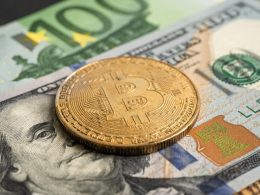In the dynamic landscape of global economics, the status of a currency as a global standard holds immense significance. Europe, historically a powerhouse of economic influence, finds itself at a crossroads in maintaining the global status of its currency, the Euro. This article delves into the imperatives behind safeguarding Europe’s global currency status and explores strategies to ensure its resilience in an ever-evolving financial ecosystem.
The Significance of a Global Currency Status

A global currency status endows a nation or a union with unparalleled advantages in international trade, investment, and monetary policy. For Europe, the Euro’s prominence in global transactions facilitates smoother trade relations with both developed and emerging economies. Additionally, it reinforces the region’s economic stability and sovereignty while diminishing vulnerability to external economic shocks.
Challenges to Europe’s Currency Hegemony
Despite its advantages, Europe faces multifaceted challenges in preserving the Euro’s global dominance. The rise of economic giants like China, coupled with geopolitical tensions and technological disruptions, threatens the Euro’s hegemony. Furthermore, internal fissures within the European Union (EU) regarding fiscal policies and member states’ economic disparities pose formidable obstacles to the Euro’s global ascension.
Imperatives for Safeguarding Europe’s Global Currency Status
- Enhancing Economic Integration: Strengthening economic integration within the EU is imperative to bolstering the Euro’s global stature. Harmonizing fiscal policies, reducing trade barriers, and fostering intra-regional investments can fortify the Eurozone’s economic resilience.
- Innovative Monetary Policies: Europe must adopt innovative monetary policies to adapt to evolving global financial dynamics. Embracing digital currencies, leveraging blockchain technology, and enhancing monetary flexibility can enhance the Euro’s attractiveness in the global market.
- Geopolitical Diplomacy: Engaging in strategic geopolitical diplomacy is essential for safeguarding Europe’s currency hegemony. Forge stronger alliances with key global players, enhance cooperation with emerging economies, and mitigate geopolitical risks through diplomatic dialogue.
- Investment in Infrastructure and Technology: Investing in robust infrastructure and emerging technologies is crucial for enhancing Europe’s economic competitiveness. Building state-of-the-art financial infrastructure and promoting technological innovation can elevate the Euro’s global standing in the digital age.
Strategies for Long-Term Resilience
- Diversification of Trade Partnerships: Europe must diversify its trade partnerships beyond traditional markets to mitigate dependency risks. Strengthening ties with emerging economies in Asia, Africa, and Latin America can broaden the Euro’s global footprint.
- Promotion of Financial Inclusion: Promoting financial inclusion and accessibility is pivotal for expanding the Euro’s global reach. Facilitating cross-border transactions, supporting SMEs, and empowering underbanked populations can enhance the Euro’s inclusivity and attractiveness.
- Sustainable Economic Development: Prioritizing sustainable economic development is essential for ensuring the Euro’s long-term resilience. Embracing green finance, promoting sustainable investments, and adhering to ESG principles can bolster Europe’s reputation as a responsible global economic player.
- Adaptation to Technological Trends: Embracing emerging technological trends such as artificial intelligence, big data analytics, and fintech innovations is imperative for future-proofing Europe’s financial ecosystem. Investing in research and development and fostering a conducive regulatory environment can propel Europe to the forefront of digital finance.
Analysis Table: Factors Impacting Europe’s Global Currency Status
| Factors | Impact |
|---|---|
| Economic Integration | Strengthening economic ties enhances Euro’s resilience |
| Geopolitical Stability | Mitigates currency volatility and geopolitical risks |
| Technological Advancements | Enhances Euro’s attractiveness in the digital economy |
| Fiscal Policies and Stability | Ensures credibility and stability of the Euro |
| Trade Relations | Diversification minimizes dependency risks |
Comparative Table: Euro vs. Global Currencies
| Criteria | Euro | US Dollar | Chinese Yuan |
|---|---|---|---|
| Global Trade Settlement | Widely used in international transactions | Predominant global reserve currency | Increasing usage in global trade |
| Monetary Policy Flexibility | Subject to ECB policies | Influenced by Federal Reserve decisions | Controlled by the People’s Bank of China |
| Geopolitical Influence | Reflects EU’s collective influence | Reflects US economic and political power | Reflects China’s rising global stature |
| Digital Currency Integration | Exploring digital Euro | Dominance in digital payment systems | Pioneering digital Yuan initiatives |
Conclusion
Safeguarding Europe’s global currency status is imperative for maintaining the region’s economic sovereignty and influence in the international arena. By addressing internal disparities, embracing technological innovations, and fostering strategic partnerships, Europe can fortify the Euro’s resilience and ensure its continued prominence in the global financial landscape. As Europe navigates through unprecedented challenges, proactive measures and collaborative efforts are essential in preserving its currency hegemony for generations to come.












